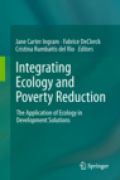
Integrating ecology and poverty reduction: the application of ecology in development solutions
Ingram, Jane Carter
DeClerck, Fabrice
Rumbaitis del Rio, Cristina
The second volume of this series, Integrating Ecology into Global Poverty Reduction Efforts: Opportunities and solutions, builds upon the first volume, Integrating Ecology into Global Poverty Reduction Efforts: The ecological dimensions to poverty, by exploring the way in which ecological science and tools canbe applied to address major development challenges associated with rural poverty. In volume 2, we explore how ecological principles and practices can be integrated, conceptually and practically, into social, economic, and political norms and processes to positively influence poverty and the environment upon which humans depend. Specifically, these chapters explore how ecological science, approaches and considerations can be leveraged to enhance the positive impacts of education, gender relations, demographics, markets and governance on poverty reduction. As the final chapter on “The future and evolving role of ecological science” points out, sustainable development must be build upon an ecological foundation if it is to be realized. The chapters in this volume illustrate how traditional paradigms and forces guiding development can be steered along more sustainable trajectories by utilizing ecological science to inform project planning, policy development, market development and decision making. Explores the way in which ecological science and tools can be applied to address major development challenges associated with rural poverty. Details howecological principles and practices can be integrated, conceptually and practically, into social, economic, and political norms and processes to positivelyinfluence poverty and the environment upon which humans depend. Illustrates how traditional paradigms and forces guiding development can be steered along more sustainable trajectories by utilizing ecological science to inform projectplanning, policy development, market development and decision making. INDICE: Chapter 1. Introduction: Changing Societal Paradigms-Education andGender as Critical Starting Points, Authors:Fabrice DeClerck and Jane Carter Ingram. Chapter 2: Changing Societal Paradigms-Education and Gender as Critical Starting Points: Education, Ecology and Poverty Reduction, Authors: Robin Sears and Angela M. Stewart. Chapter 3: Changing Societal Paradigms-Education and Gender as Critical Starting Points: Why Gender Matters to Ecological Management and Poverty, Author: Isabelle Guttierez. Chapter 4. Introduction to Population Growth, Ecology and Poverty, Author: Alex de Sherbinin. Chapter 5. Population Growth, Ecology and Poverty, Authors: Jason Bremner, Jason Davis, and David Carr. Chapter 6. Alliances, conflicts and mediations: the role of population mobility in the integration of ecology into poverty reduction, Authors: Susana Adamo, Sara Curran. Chapter 7. Urbanization, poverty reduction and ecosystem integrity, Authors: Peter Marcotullio, Hunter College, Sandra Baptista and Alex de Sherbinin. Chapter 8. Introduction to Innovative Financing for Conservation and Poverty Reduction, Author: Jane Carter Ingram. Chapter 9. Innovative Financing: Payments for Ecosystem Services- an Introduction, Author: Michael Jenkins. Chapter 10. Innovative Financing: The potential of carbon offsetting projects in the forestry sector for poverty reduction in developing countries, Authors: Manuel Estrada, Esteve Corbera. Chapter 11. Innovative Financing: TheDevelopment of Payments for Ecosystem Services as a Community-based Conservation Strategy in East Africa, Authors: Hassan Sachedina, Fred Nelson. Chapter 12. Innovative Financing: 12. Innovative Financing: Poverty, Payments and Ecosystem Services in the Eastern Arc Mountains of Tanzania, Author: Brendan Fisher. Chapter 36. Innovative Financing: Prioritizing and targeting payments for ecosystem services for energy, biodiversity conservation and poverty alleviation, Authors: Natalia Estrada Carmona and Fabrice DeClerck. Chapter 13. Introduction to Ecosystem Based Management for Conservation and Poverty Reduction, Author: Jane Carter Ingram. Chapter 14. Governing Ecosystems for Conservation and.Poverty Reduction: Ecological Principles for Managing Sustainable Fisheries, Author: Caleb McClenn. Chapter 15. Governing Ecosystems for Conservation and Poverty Reduction: Land Use Zoning as a Tool for Balancing Conservation and Poverty Reduction, Author: Lisa Naughton. Chapter 16. Governing Ecosystems for Conservation and Poverty Reduction: The Role of Protected Areas for Poverty Reduction, Author: Maggie Holland. Chapter 17. Looking Ahead: The Future and Evolving Role of Ecology in Society , Author: Shahid Naeem. Chapter 18. Conclusions, Authors: Jane Carter Ingram, Fabrice DeClerck, Cristina Rumbaitis del Rio.
- ISBN: 978-1-4614-0185-8
- Editorial: Springer New York
- Encuadernacion: Cartoné
- Páginas: 400
- Fecha Publicación: 28/10/2011
- Nº Volúmenes: 1
- Idioma: Inglés
